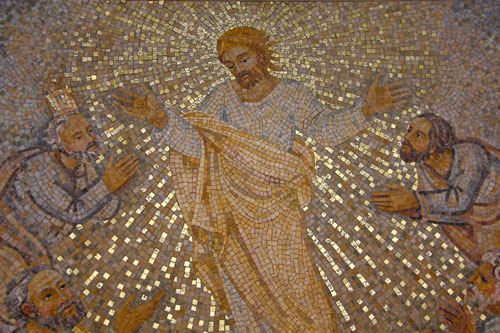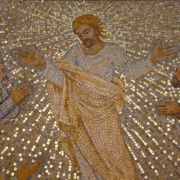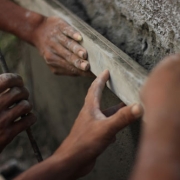Fellow Laborers
/2 Comments/in For Pastors, Preachers, Bible Teachers/by David GuzikMark, Aristarchus, Demas, Luke, my fellow laborers.
(Philemon 24)
This email of encouragement is intended for pastors, preachers, and Bible teachers – those who serve the Lord and His people through the ministry of the Word. I try to send it out every other week, and I send it on Mondays because I think that many of you have worked hard to serve the Lord over the weekend. I hope you can see some encouragement in this short verse from Philemon.

In this verse, Paul listed four people whom he regarded as his fellow laborers. They were:
– Mark (most likely John-Mark, the author of the Gospel of Mark)
– Aristarchus (one of Paul’s companions and fellow-prisoners)
– Demas (a companion of Paul who later forsook him)
– Luke (Paul’s companion and the author of the Gospel of Luke)
Yet, in Paul’s other letters, we find a few others whom he also regarded as his fellow laborers, notably Timothy (1 Thessalonians 3:2) and Philemon (Philemon 1).
Is it too much of a stretch to say that we also are fellow laborers with Paul and all others who have served God and His people through the generations? The circle of Paul’s fellow laborers didn’t only include the people of his own time, but also the circle extended into the future.
If you are a servant of God, think about the team you belong to: Paul, Peter, Timothy, Priscilla and Aquilla, Lydia, Polycarp, Athanasius, Francis, Martin and Katie Luther, Zwingli, Spurgeon, Amy Carmichael, Moody, Corrie ten Boom, Billy Graham – it’s an unending list!
So, don’t forget that we are laborers. If you’re tired after a weekend of serving, it’s OK – it’s work!
But also, don’t forget that we are fellow laborers. We serve God in connection with all His servants in generations past and present – and future, should the Lord tarry!
What a wonderful team we are on, with Jesus Christ the captain of our salvation (Hebrews 2:10).
Blessings to You in Jesus’ Name – David Guzik
Click Here to Receive Email from David for Pastors, Preachers, and Bible Teachers
Speak the Word, Live the Life
/0 Comments/in Weekly Devotional/by David GuzikSpeak these things, exhort, and rebuke with all authority. Let no one despise you. (Titus 2:15)
These words from the Apostle Paul come at the end of a long section where he told Titus how to lead the churches on the island of Crete. Titus chapter 2 is filled with practical guidance for the pastor and the church leader, and the chapter ends with this interesting statement. Paul told Titus, “Speak these things, exhort, and rebuke with all authority. Let no one despise you.”

The first thing is to speak these things. Titus, and every one of God’s messengers of grace are directed to speak the things of God’s Word. What Paul wrote to Titus (these things) was and is God-inspired Scripture.
We could have an interesting discussion over the question, “Did Paul knowwhat he wrote was Scripture?” But it really doesn’t matter if Paul was aware of it or not. God guided Paul and the other human authors of Scripture, enabling them to write His inspired Word through their own human personality.
These things were to be the focus of what Titus taught. The preacher must always stay centered on God’s Word.
Next, Paul told Titus to exhort and rebuke– and to do it with all authority. God’s messengers are to remember that they are messengers from a King, holding the word that brings life and turns back hell. The preacher needs to speak forth God’s Word, exalting it high above human opinion and speculation. When the preacher speaks, sometimes it will be encouraging (exhort) sometimes correcting (rebuke).
Finally, Paul told Titus, “let no one despise you.” This didn’t happen by Titus making a rule saying that Christians weren’t allowed to despise him. It happened because Titus lived a life of love and integrity. If Titus spoke with all authority, he had to back it up with his life. Titus had to live in such a way so that no one could rightfully despise him or his message.
One commentator points out that it was common for these letters from Paul to be read in the churches. Therefore, this remark, “let no one despise you,” was also something for the Christians and Crete to hear. When they saw Titus living an honorable and godly life, they had to step up and respect him and his message, even when it was a rebuke.
I’m sure that at some point this week God will have a word to encourage you (exhort) or to correct you (rebuke). Be ready to receive either word and to respond to it.
Der sich selbst für uns hingegeben hat
/0 Comments/in Wöchentliche Andacht/by David GuzikDer sich selbst für uns hingegeben hat, um uns von aller Gesetzlosigkeit zu erlösen und für sich selbst ein Volk zum besonderen Eigentum zu reinigen, das eifrig ist, gute Werke zu tun. (Titus 2,14)
Wir glauben, dass die gesammelten Briefe des Apostel Paulus im Neuen Testament von Gott inspiriert wurden und dass sie uns Gottes Wort mitteilen. Es gibt bestimmte Stellen, an denen diese Inspiration deutlicher ist; Stellen, an denen die Botschaft des Evangeliums in so kurzer und herrlicher Weise verdeutlicht wird, dass man sagen kann: „Gott ist in diesem Geschriebenen.“

Ich denke, diese kurze Aussage in Titus 2,14 ist eine dieser Stellen. Als Paulus schrieb: „der sich selbst für uns hingegeben hat“ ist jeder Teil dieser Beschreibung von Jesu Werk schön und wichtig.
Jesus hat sich hingegeben, das heißt, es geschah freiwillig. Er musste das nicht tun, doch Er tat es aus Liebe. Johannes 3, 16 sagt, dass der Vater den Sohn gab. Aber vergiss nicht, dass auch Jesus gab.
Jesus gab sich selbst, das heißt, Er gab alles, was Er geben konnte. Man kann jemandem helfen, sogar sehr helfen, ohne sich selbst zu geben. Doch Jesus gab das Größte, das Er je geben konnte: Er gab sich selbst.
Jesus gab sich selbst für uns, das heißt, Er gab sich als Ersatz für den sündigen Menschen. Wir brauchten einen Ersatz, jemanden, der an unserer Stelle als schuldiger Sünder vor Gott steht. Jesus nahm die Schuld für uns. Er nahm die Schande für uns.
Jesus tat all das, um uns zu erlösen. Erlösung bedeutet „aus der Sklaverei durch die Zahlung eines Lösegelds freigekauft zu werden“. Wir wurden aus der Sklaverei der Sünde freigekauft für Seinen Dienst. Der Tod Jesu brachte uns nicht nur Vergebung, sondern auch neues Leben. Wir sind befreit worden von aller Gesetzlosigkeit.
Jesus tat dies, um etwas besonderes für uns zu tun – um uns zu einem Volk zum besonderen Eigentum zu machen. William Barclay nach meint dieser Ausdruck die Kriegsbeute, die der König nach einer gewonnen Schlacht für sich selbst beanspruchte. Wir – sein Volk zum besonderen Eigentum– sind Seine Belohnung, wir sind die Beute von Jesu großem Sieg am Kreuz.
In nur 32 Worten auf Deutsch ist dies eine wunderbare Zusammenfassung von Gottes großer Liebe und Seinem Werk in uns durch Jesus Christus. Danke Jesus dafür, dass Er sich selbst hingegeben hat und dich zu Seinem Volk zum besonderen Eigentum gemacht hat.
He Gave Himself
/2 Comments/in Weekly Devotional/by David GuzikWho gave Himself for us, that He might redeem us from every lawless deed and purify for Himself His own special people, zealous for good works. (Titus 2:14)
We believe that the collected letters of the Apostle Paul in the New Testament were inspired by God, that they communicate God’s word to us. There are certain places where this inspiration is more obvious; places where the message of the gospel is given in such a brief and glorious way that it says, “God was in this writing.”

I think that this brief statement in Titus 2:14 is one of those places. When Paul wrote, “Who gave Himself for us,” every part of this description of Jesus’ work is beautiful and important.
Jesus gave, which means it was voluntary. He didn’t have to do what He did, but He did it out of love. It’s good to emphasize what John 3:16 says – that the Father gave the Son. But don’t forget that Jesus also gave.
Jesus gave Himself, which means Jesus gave all He could give. It’s possible to help someone, and even to help them in a big way, without really giving yourself. Yet Jesus gave the greatest thing He could ever offer: He gave himself.
Jesus gave Himself for us, which means Jesus was given as a substitute for sinful man. We needed a substitute, someone to stand in our place as guilty sinners before God. Jesus took the guilt for us. He took the shame for us.
Jesus did it all that He might redeem us. Redemption means “to be bought out of slavery by the paying of a ransom.” We are bought out of our slavery to sin and purchased for His service. The death of Jesus wasn’t only to bring us forgiveness, but also to give us new life. We are set free from every lawless deed.
Finally, Jesus did this to make something special of us – to make us His own special people. According to William Barclay, the idea behind this phrase is the spoil of battle that a conquering king set aside for himself. We – His own special people– are His reward, we are the plunder of Jesus great victory at the cross.
There it is – only 25 words in English, but a beautiful summary of God’s great love and great work of us in Jesus Christ. Thank Jesus today that He gave Himself for you, making you one of His own special people.
Die glückselige Hoffnung
/1 Comment/in Wöchentliche Andacht/by David GuzikIndem wir die glückselige Hoffnung erwarten und die Erscheinung der Herrlichkeit des großen Gottes und unseres Retters Jesus Christus (Titus 2,13)
In vorigen Vers hat Paulus Titus gesagt, was die Gnade uns lehrt: dass wir die Gottlosigkeit und die weltlichen Begierden verleugnen sollen und dass wir gerecht leben sollen. Titus 2,13 führt diesen Gedanken weiter.

Einfach ausgedrückt: die Gnade lehrt uns, auf das zweite Kommen Jesu zu warten. Paulus schreibt, dass wir die glückselige Hoffnung erwarten und die Erscheinung der Herrlichkeit des großen Gottes und unseres Retters Jesus Christus.
Mit anderen Worten: die Gnade lehrt uns die glückselige Hoffnung zu erwarten und uns darauf vorzubereiten. Diese Hoffnung ist nicht der Himmel oder die Herrlichkeit, sondern Jesus selbst, von Angesicht zu Angesicht, näher als je zuvor.
Doch wir warten nicht nur auf das Kommen Jesu; wir leben in aktiver Erwartung der Wiederkehr Jesu. Wir suchen danach. Über die Wiederkehr von Jesus nachzudenken sollte für jeden Christen etwas Wertvolles sein.
Das erste Mal kam Jesus um die Seelen der Menschen zu retten; Er wird ein zweites Mal kommen, um die Körper auferstehen zu lassen.
Das erste Mal kam Jesus um den Einzelnen zu retten; Er wird ein zweites Mal kommen um die Gesellschaft zu retten.
Das erste Mal kam Jesus um sich kreuzigen zu lassen; Er wird ein zweites Mal kommen, um sich krönen zu lassen.
Das erste Mal ging Jesus an ein Kreuz; Er wird ein zweites Mal kommen, um einen Thron zu besteigen.
Das erste Mal kam Jesus in Demut; Er wird ein zweites Mal in Herrlichkeit kommen.
Das erste Mal stand Jesus vor Pilatus; Er wird ein zweites Mal kommen und Pilatus wird vor Ihm stehen.
Das erste Mal wurde Jesus von Menschen gerichtet; Er wird ein zweites Mal kommen und die Menschen richten.
Achte darauf, was Paulus sagt, wer wiederkommen wird: der große Gott und unser Retter Jesus Christus. Hin und wieder sagen manche Menschen, dass Paulus und die frühen Christen nicht wirklich glaubten, dass Jesus Gott war. Doch dies hier zeigt, dass Paulus nicht nur wusste, dass Jesus Gott war, sondern dass Er der große Gott und Retter war und ist.
Dieser Jesus kam einst – und Er wird wiederkommen, so wie Er es versprochen hat. Lass dich von der Gnade lehren, nach Seiner Rückkehr zu suchen und bereit zu sein für diesen Tag.
Co-Workers with Jesus
/0 Comments/in For Pastors, Preachers, Bible Teachers/by David GuzikWe then, as workers together with Him also plead with you not to receive the grace of God in vain.
2 Corinthians 6:1

There are many wonderful titles for those who do God’s work. We can be called servants, teachers, pastors, elders, preachers, deacons and so forth. Here in 2 Corinthians 6:1 Paul gave one of the most amazing and wonderful titles: workers together with Him.
Think about it. Paul saw himself as a co-worker with Jesus Christ. The use of we instead of “I” shows that Paul didn’t only consider himself as a co-worker with Jesus, but also others who served the Savior.
What an amazing job you have: workers together with Him! It isn’t that God needed Paul, or that God needs any of us. Instead, it is that God wants us to be workers together with Him for our good.
It’s like the little boy with the toy lawnmower following dad as dad mows the lawn. For the sake of pure efficiency, dad should ask the boy to go away because he is really just in the way. But it is so good for the boy to work with dad! And because dad loves his boy, he wants him to work together with Him.
The word “workers” itself is important. There is something good and important in work itself, so much so that God wants us to be workers together with Him. God’s best for our life is never a state of ease and comfort and indulgent inactivity – even if we did all those things together with Him. God wants us to be workers together with Him, not “couch potatoes” or “pew potatoes” together with Him.
We are workers together with Him. Paul never said God works together with us. It isn’t our work that God helps us with. It is His work that He asks us to do together with Him. Instead of trying to get God to help us with our work, we need to find out what God’s work is, and do it with Him.
After a weekend of serving God, take little pleasure in recognizing one of the wonderful things about Christian ministry: we get to work together with Jesus Christ. He wants you to work with Him and to advance His kingdom. How honored we all are to do this!
Blessings to You in Jesus’ Name – David Guzik
Click Here to Receive Email from David for Pastors, Preachers, and Bible Teachers
The Blessed Hope
/2 Comments/in Weekly Devotional/by David GuzikLooking for the blessed hope and glorious appearing of our great God and Savior Jesus Christ (Titus 2:13)
In the previous verse, Paul told Titus what grace teaches: that we should deny ungodliness and worldly lusts, and that we should live righteous lives. Titus 2:13 carries on the same thought, adding to what grace teaches us.

Said plainly, grace teaches us to look for the second coming of Jesus Christ. In continuing the thought of what grace teaches, Paul wrote that we should be looking for the blessed hope and glorious appearing of our great God and Savior Jesus Christ.
In other words, grace teaches us to expect and prepare for our blessed hope. That hope is not heaven or glory, but Jesus Himself, face to face, closer than ever.
Yet we don’t just wait for the coming of Jesus; we live in active expectation of the return of Jesus. We are looking for it. The return of Jesus Christ should be precious for Christians to consider.
Jesus came the first time to save the soul of man; He will come a second time to resurrect the body.
Jesus came the first time to save the individual; He will come a second time to save society.
Jesus came the first time to a crucifixion; He will come a second time to a coronation.
Jesus came the first time to a cross; He will come a second time to a throne.
Jesus came the first time in humility; He will come a second time in glory.
Jesus came the first time and stood before Pilate; He will come a second time and Pilate will stand before Him.
Jesus came the first time and was judged by men; He will come a second time to judge all men.
Finally, notice whom Paul says will return: our great God and Savior Jesus Christ. From time to time, some people try to say that Paul and other early Christians didn’t really believe Jesus was God. This shows that not only did Paul know Jesus was God, but that He was and is the great God and Savior.
That same Jesus came once – and He will return just as He promised. Let grace teach you to keep looking for His return and be ready for that great day.






